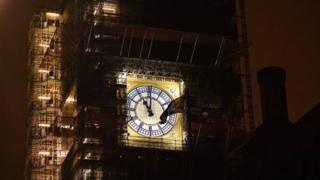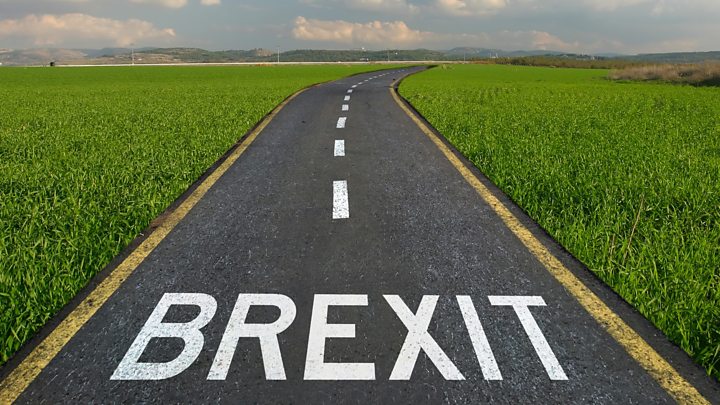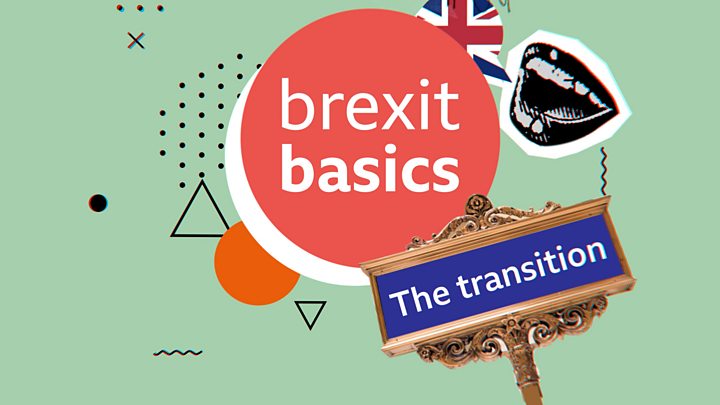[ad_1]

Image copyright
Getty Images
Britain is preparing to leave the European Union at 23:00 GMT with a mixture of celebration and regret.
Pro and anti-Brexit protesters have been making their voices heard at events across the country.
Prime Minister Boris Johnson – who led the 2016 Leave campaign – will call for the nation to come together in a video message at 22:00 GMT.
He will hail a “new dawn” for the UK, as European leaders warn of a tough battle ahead in trade talks.
UK citizens will notice few immediate changes as the country officially leaves the EU, after 47 years of membership.
Most EU laws will continue to be in force – including the free movement of people – until 31 December, when the transition period comes to an end.
The UK is aiming to sign a permanent free trade agreement with the EU – along the lines of the one the EU has with Canada – by that deadline.
Image copyright
PA Media
Pro-EU campaigners take part in a “Missing EU Already” rally outside the Scottish Parliament
Image copyright
Reuters
Pro-Brexit campaigners are staging a celebration rally in central London
Mr Johnson earlier held a Cabinet meeting Sunderland, in north-east England, the city that was the first to back Brexit when results were announced after the referendum.
It came as anti-Brexit campaigners staged a march past Downing Street, to “bid a fond farewell” to the union.
Pro-Brexit campaigners are holding a celebration rally in nearby Parliament Square, which is lined with Union flags.
The event will see speeches by Brexit Party leader Nigel Farage, who successfully campaigned for the 2016 referendum, among others.
A clock counting down to the moment the UK leaves the EU will be projected on to Downing Street.
But Big Ben will not chime at 23:00 GMT due to ongoing renovation works, despite a campaign by Brexiteers for the famous “bongs” to be sounded.
In Brussels, the British flag has been removed from its pole outside the European Parliament and replaced with the flag of the European Union.

Media playback is unsupported on your device
Britain voted by 52% to 48% to leave the EU in a 2016 referendum, but wrangling over how to implement the result, or whether there should be another referendum, brought Parliament to a standstill.
Mr Johnson managed to secure an early general election in December last year, which he won with an 80 seat majority, on a promise to “get Brexit done”.
But opinion polls suggest the UK public remains deeply divided over the issue.
In his video message, an hour before Britain’s official departure, Mr Johnson will say: “The most important thing to say tonight is that this is not an end but a beginning.
“This is the moment when the dawn breaks and the curtain goes up on a new act. It is a moment of real national renewal and change.”
Image copyright
PA Media
Sinn Fein deputy leader Michelle O’Neill takes part in a demonstration at the border
Emmanuel Macron has delivered his own address to the nation in France, describing Brexit as an “alarm signal” which should be heard across the EU.
The French president said: “At midnight, for the first time in 70 years, a country will leave the European Union.
“It is a historic alarm signal that must be heard in each of our countries.”
European Commission President Ursula von der Leyen paid tribute to UK citizens who had “contributed to the European Union and made it stronger”.
Upcoming trade negotiations would be “fair” but each side would fight for its interests, she added.

Media playback is unsupported on your device
But European Council President Charles Michel warned: “The more the UK will diverge from the EU standards, the less access to the single market it will have.”
Anti-Brexit campaigners have, meanwhile, demanded Northern Ireland – where a majority voted to remain in the EU – continues to have a voice in the EU after the UK leaves. at a series of protests at the border.
In Scotland, which also voted to stay in the EU in the 2016 referendum, candlelit vigils are being held.
In a speech in Edinburgh, First Minister Nicola Sturgeon said Scotland was being “taken out of the European Union against the wishes of the overwhelming majority” of its people.
Speaking in Cardiff, Welsh First Minister Mark Drakeford said Wales, which voted to leave the EU, remained a “European nation”.
Liberal Democrat acting leader Sir Ed Davey vowed his pro-EU party would “never stop fighting” to have the “closest possible relationship” with Europe and try to prevent a “hard Brexit hurting British people”.
[ad_2]
Source link
